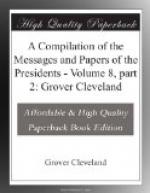As there is nothing narrow, selfish, illiberal, or exclusive in the views of the United States as set forth in this treaty, as it is indispensable to the successful completion of the contemplated canal to secure protection to it from the local authorities and this Government, and as I have no doubt that the British pretension to the port of San Juan in right of the Mosquito King is without just foundation in any public law ever before recognized in any other instance by Americans or Englishmen as applicable to Indian titles on this continent, I shall ratify this treaty in case the Senate shall advise that course. Its principal defect is taken from the treaty with New Granada, the negotiator having made it liable to be abrogated on notice after twenty years. Both treaties should have been perpetual or limited only by the duration of the improvements they were intended to protect. The instructions to our charge d’affaires, it will be seen, prescribe no limitation for the continuance of the treaty with Nicaragua. Should the Senate approve of principle of the treaty, an amendment in this respect is deemed advisable; and it will be well to invite by another amendment the protection of other nations, by expressly offering them in the treaty what is now offered by implication only—the same advantages which we propose for ourselves on the same conditions upon which we shall have acquired them. The policy of this treaty is not novel, nor does it originate from any suggestion either of my immediate predecessor or myself. On the 3d day of March, 1835, the following resolution, referred to by the late President in his message to the Senate relative to the treaty with New Granada, was adopted in executive session by the Senate without division:




